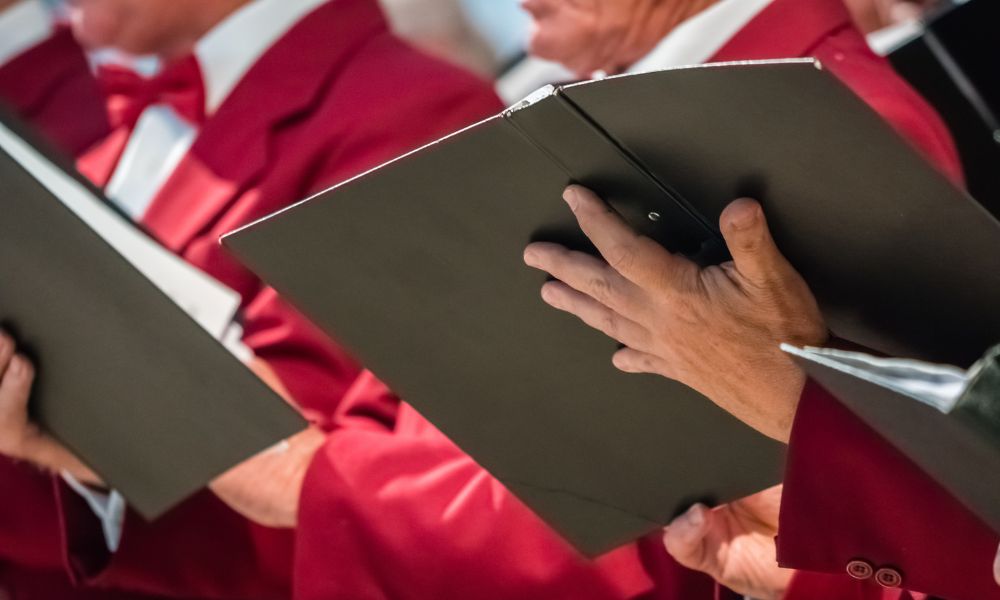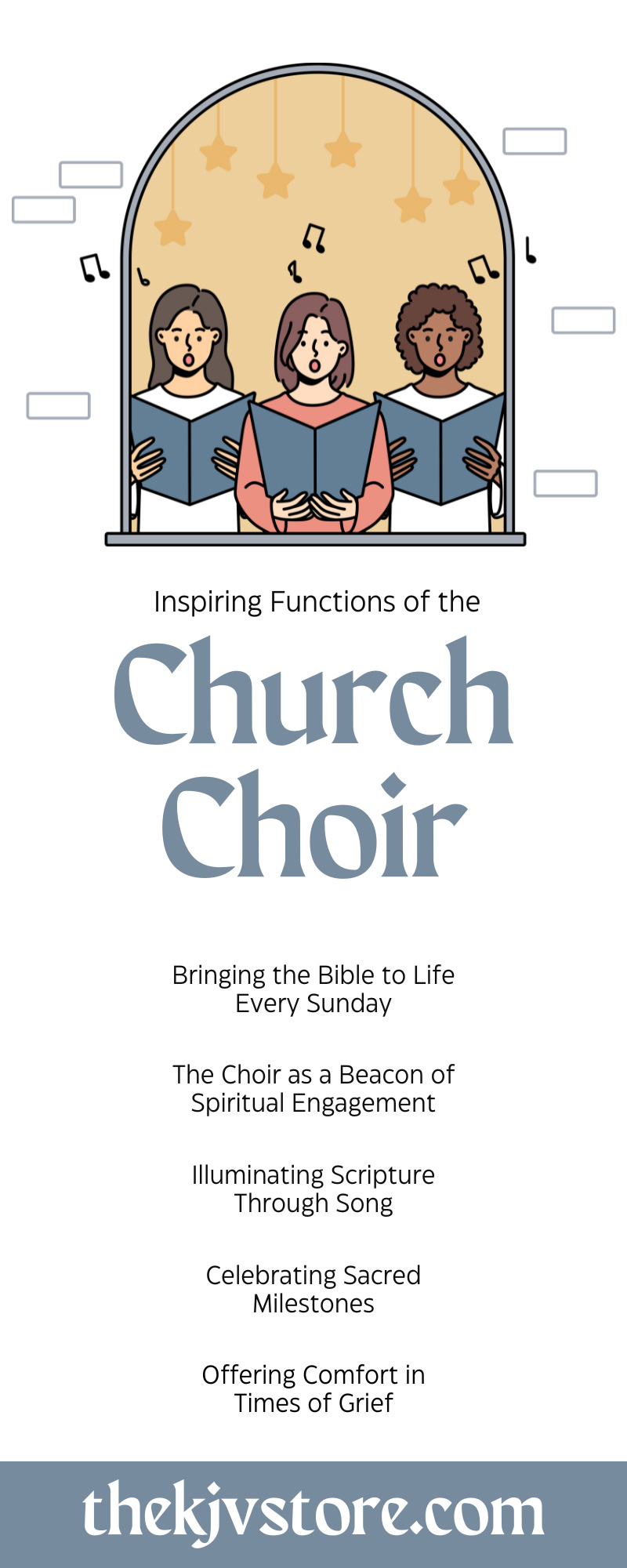7 Inspiring Functions of the Church Choir

Church choirs embody the power of collective praise. Invoking the Holy Spirit through music, these harmonious assemblies are not performers, and their role is not to entertain. Rather, they are vessels of grace, facilitating an immersive and transcendent worship experience.
From the resonant echoes of the Westminster Abbey Choir to the soul-stirring hymns of the Harlem Gospel Choir, church choirs have inspired worship and fostered community bonds. Follow along as we detail seven inspiring functions of the church choir.
Bringing the Bible to Life Every Sunday
The tradition of choral music in worship has ancient roots, deeply embedded in the biblical injunction of Psalm 100 to “make a joyful noise unto the Lord.” This divine call to song has echoed through the ages. Hear it in the Gregorian chants of the 4th century and the intricate polyphony of the Middle Ages. Find it in the glory of Renaissance polyphony and Baroque counterpoint. Feel it in the vibrant gospel performances of the modern era. The evolutionary arc of choral music underscores the constant presence of choirs as an indispensable aspect of spiritual life.
The Choir as a Beacon of Spiritual Engagement
Church choirs, in their essence, serve as the heartbeat of worship, inviting congregations into a deeper, more active engagement with the divine. Choirs can help focus the congregation for the call to worship. They provide a powerful sense of the presence of the divine for the invocation. They lead the congregation in hymns, giving worshippers the courage to express their devotion, gratitude, and longing in a collective setting.
Where there’s a choir to lead the song, congregants who aren’t confident about their musical ability can join in without fear of judgment. They participate in the joy and praise that comes with musical forms of worship. From the soaring sopranos to the grounding basses, the faithful find a shared language of worship, uniting in a harmonious declaration of faith.
Illuminating Scripture Through Song
Choirs also play a critical educational role, illuminating the meaning of scripture through song. Hymns and anthems, carefully chosen to complement liturgical themes, breathe life into biblical passages, making the ancient texts accessible and relatable. Through music, the choir leads the congregation on a reflective journey, exploring the depths of faith and encouraging a personal connection with the divine narrative.
Certain tunes have stood the test of time to become ingrained in memory so thoroughly that congregants join in with confidence. When worshipers know the tune, they can concentrate on the meaning of the words.
A perfect example is the Doxology, known to almost everyone who has ever attended a Christian service. The Doxology, or the Old Hundredth as it is also known, is something worshipers typically sing as an offertory. It thanks God for his many blessings upon his people and refocuses the singers on gratitude and faith in the Father, Son, and Holy Ghost.
When the choir supports the pastor with musical interpretations of scripture, congregants might follow the text in their pew Bible. They may also find inspiration to visit a Bible store to pick up their own copy of the Bible and pursue further reading at home.
Celebrating Sacred Milestones
The church choir is a constant celebrant of the passages of life. From the jubilation of baptisms to the solemnity of confirmations, choirs underscore these sacred rituals with music that reflects the weight and wonder of these moments. Likewise, in the covenant of marriage, choirs enhance weddings with hymns that celebrate love, commitment, and the blessing of companionship, elevating the ceremony into a heavenly experience.
Choral works are especially cherished during the holiest days of the Christian calendar, at Christmas and Easter. The mysterious peace of “Silent Night” or “Still, Still, Still” and the majesty of the Christmas portion of Handel’s Messiah draw worshipers toward the true meaning of Christmas.
The anguish of the Crucifixion is brought home through a hymn like “O Sacred Head Now Wounded.” The joy of Easter bursts forth with the traditional “Christ the Lord Is Risen Today.” Even if the pews are thinly populated other times of year, sacred choral music may inspire the Christmas and Easter visitors to attend church more often.
Offering Comfort in Times of Grief
Beyond leading praise, choirs provide a profound sense of comfort and solace during life’s most challenging moments. Through the soothing phrases of a requiem or the uplifting promise of a spiritual, choral music at funerals and memorial services embodies communal support so fundamental to church life. Personal testimonies abound of individuals finding solace in the choir’s melody, a soothing balm that eases the pain of loss with the promise of eternal love and reunion.
Service and Community Through Music
Beyond worship, church choirs offer invaluable opportunities for service and fellowship. The commitment to rehearsal and performance fosters discipline and dedication, while the collective pursuit of musical excellence creates deep bonds among choir members. For many, joining the choir is a gateway to active participation in the larger church community, opening doors to friendships and shared missions that extend far beyond the choir loft.
Grace and Benediction
Church choirs can bookend a worship service from the call to worship and invocation to the benediction. A choral benediction bolsters and supports the service’s celebrant with a musical exclamation point. It sends the congregation back into the world with a sense of purpose, faith, and peace to carry them through the coming week.
In a world often marked by discord and division, the church choir remains a source of harmony and hope. Through the collective act of singing, choirs invite us to partake in a timeless tradition of joyful noise, a celebration of faith that nourishes the soul and binds the community. In every note and every silence, we are reminded of the profound beauty that arises when voices join in song.
The role of church choirs in worship and community is a precious heritage, a living practice that continues to inspire, comfort, and unite. In a chorus of united voices, we find not just the sound of devout worship but the very heartbeat of the church itself.

